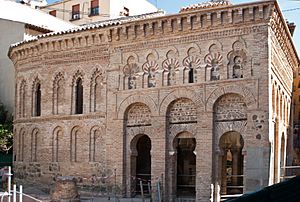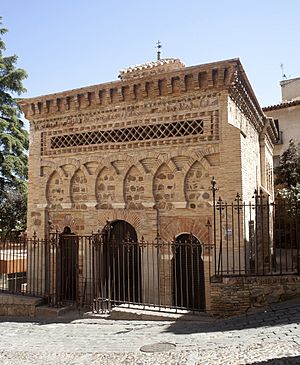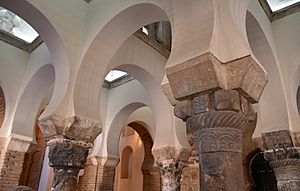Mosque of Cristo de la Luz facts for kids
The Mosque of Cristo de la Luz is a special building in Toledo, Spain. It used to be a mosque (a Muslim place of worship). Now, it is a Catholic chapel. It's one of the few mosques that existed in Toledo during the time of the Moors. Back then, it was called Mezquita Bab-al-Mardum. This name came from a nearby city gate. You can find it close to the Puerta del Sol. This area was once home to many wealthy Muslim families.
Contents
History of the Chapel
This amazing building was constructed in Toledo in the year 999. What makes it rare is that it looks almost the same today as it did when it was first built. A person named Ahmad Ibn Hadidi paid for its construction.
An old Arabic message is carved into the building's south-west side. It is written in a special style called Kufic script. This message tells us that Musa Ibn Ali was the architect. It also says the mosque was finished in the year 390 of the Islamic calendar.
The Legend of King Alfonso VI
There's a famous story about this place. It says that when King Alfonso VI took over Toledo in 1085, his horse stumbled near this chapel. Legend has it that a candle had been burning inside a crack in the wall for centuries. It had stayed lit throughout the entire time Muslims ruled the city.
When the King explored further, a beam of light showed him a hidden crucifix. This statue of Christ had been hidden for a very long time. The King then left his shield there. It had a message saying this was where the first Christian mass was held after he won Toledo. The crucifix was later moved to the Santa Cruz Museum in the same city.
Becoming a Chapel
In 1186, King Alfonso VIII gave this building to the Knights of the Order of St John. They changed it into a Christian chapel. It was then renamed the Chapel of the Holy Cross (Ermita de la Santa Cruz). This is when the rounded part at the back, called an apse, was added.
Architecture of the Building
The building is quite small, shaped like a square. It measures about 8 meters by 8 meters. A semi-circular apse was later added to its east side. The mosque is mostly built from brick and stone.
Inside, four columns hold up horseshoe arches. These arches divide the space into nine smaller sections. Each of these sections has a unique ceiling, called a vault. These vaults have special designs made from ribs (raised lines). The designs follow traditional Islamic patterns. The ribs usually don't cross in the very center.
The central vault's ceiling is higher than the others. Its ribs form a star shape. The columns and their tops (capitals) were reused from older buildings. Three of these capitals came from the time of the Visigoths.
Building Style and Influences
The way the mosque was built shows both local building traditions and ideas from the Caliphate in Córdoba. You can see Córdoba's influence in the brickwork on the outside walls. It looks similar to the famous Cathedral–Mosque of Córdoba.
Originally, the eastern wall was a solid brick wall. This was the qibla wall, which faces towards Mecca. There would have been a mihrab (a special niche) in this wall for prayers. The old mihrab was a bit larger than the other nine sections of the mosque.
The other three outer walls have three arches each. They are all similar but have different decorations. The western wall was the main entrance. It has different types of arches, like a lobed arch and a wider horseshoe arch. The brickwork designs on these walls were also inspired by Córdoba's architecture.
Later Additions
Later, a semi-circular apse was added in the Mudéjar style. This style mixes Christian and Muslim art. When the apse was added, the original qibla wall and mihrab were removed. The Mudéjar style helped the new apse blend smoothly with the old building. It used similar decorations and materials. The continued use of arch designs connects the old and new parts of the building.
Next to the building, there is a small garden. It has a little fountain in the middle.
See also
 In Spanish: Cristo de la Luz para niños
In Spanish: Cristo de la Luz para niños
- Mezquita de las Tornerias
- Church of San Sebastián, Toledo
- History of medieval Arabic and Western European domes
 | Dorothy Vaughan |
 | Charles Henry Turner |
 | Hildrus Poindexter |
 | Henry Cecil McBay |




